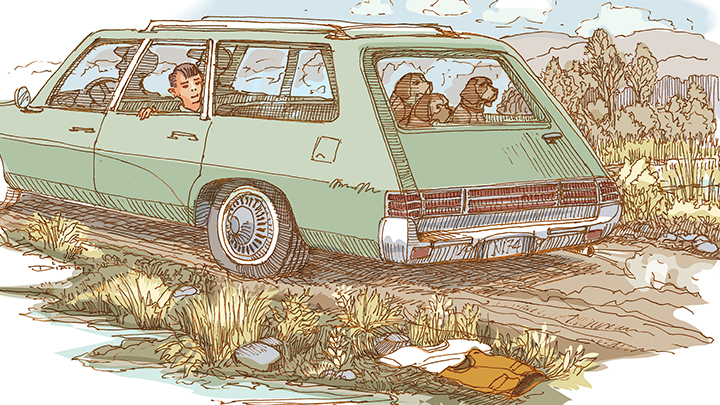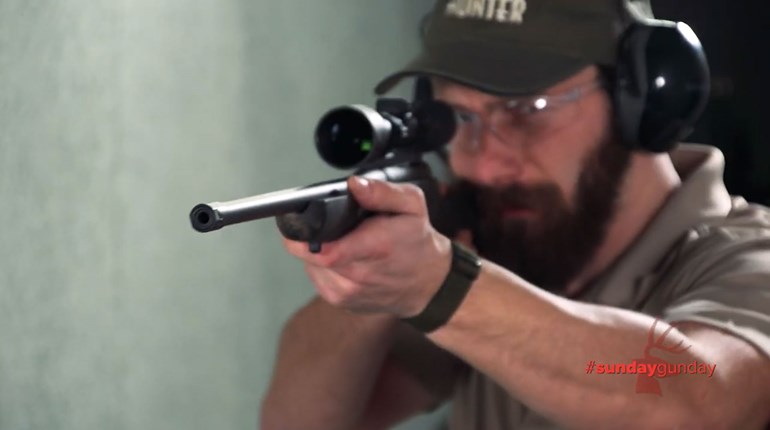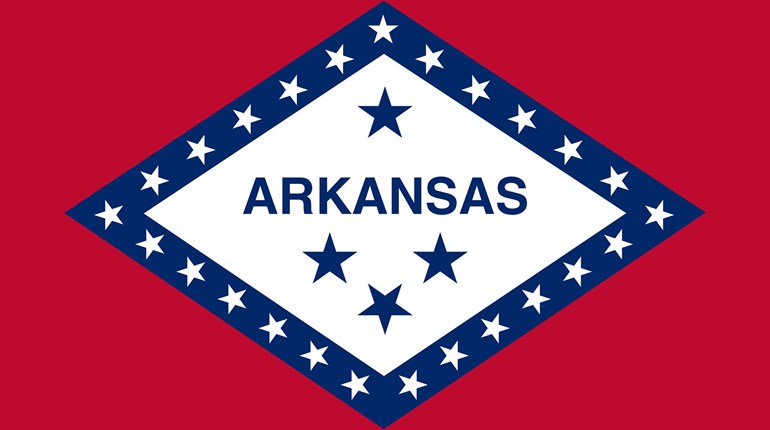
Herman and Homer were beagles. Of suspect pedigree perhaps, but their sire and dam chased rabbits. Squirmy pups they were when my dad bought them for me. Twelve dollars for the pair. I cared for and offered misguided training to these dogs during my junior-high years. They cared for and imparted wisdom to me all their lives, taking me well into college. Then, they were gone. A reasonably long life for beagles I suppose, but a far too-short life for friends.
Herman was the quintessential specimen, at least in my perception of what a beagle should be. Trim, perfectly marked and balanced, agreeable and personable, definitely built and born for the hunt. Few other things mattered. Homer? White with a dark saddle and a blocky head that spoke not of grace and fine breeding. Often the comedian. And always ready to sit awhile and enjoy pats on that broad head even if the assigned chores of chasing a rabbit had been neglected. Few of my fellow hunters—nor I—failed to indulge him. He was a good jump dog.

Before Herman and Homer entered the picture, my upbringing was rather pedestrian. To borrow in paraphrase from and apology to Charles Dickens: Those were the days of abundance. Those were the days of austerity. We had few material goods but were overflowing with country foods and sharing and love. Most of all, security. What we had supplanted what we didn’t have, so contentment reigned. But I got my beagles. It was then I was knighted, was appropriated royalty—at least in my own mind. I had Herman and Homer, and life would never be the same.
Well I recall that first hunt with Herman and Homer; it was also the first day of rabbit season. October, if memory properly serves. Training the previous month had consisted of my trailing a tame rabbit—solid white and enormous—across the pasture, into and through ragged cotton stalks and then to a grown-up ditch row. There he would rest quietly, waiting my return and his retrieval to soon again busy himself around the back yard and put behind him this senseless frivolity that infringed upon his sphere of comfort. Miniscule, this rabbit’s preferred habitat.
The beagles were then released to locate the trail. They, at some point within those rudimentary trials, began bawling and squealing with confused delight, and on one splendid exercise of this juvenile endeavor, they found the pet rabbit. I, on every excursion, circumvented their route and arrived in advance to avoid any unpleasant altercations. We practiced this regimen a few times, and I concluded that my dogs were well skilled, ready for the hunt. And they apparently were, at least partially.
That first day mentioned above broke crisp; frost festooned fallen leaves and aging grasses and blackberry tangles. Homer was the first to give voice. It was more a whining whimper than a bark or bawl, something suggesting consternation, hesitancy to make a solid proclamation. And then Herman. Short, choppy barks and the occasional whine like Homer. They sorted the trail, perhaps in a haphazard fashion but with resolve fueled by keen curiosity. Presently, the rabbit broke cover, bounding across a muddy woods road and beelining toward another tangle and slough-strewn hardwoods behind that tangle. Swamp rabbits do such things.
Then the sharp crack of my 20-gauge, and the rabbit tumbled. I was dumbfounded. Not so much because I had actually made the shot; I had made shots before. Something else was at play; something else had engulfed me. This stupefying proviso was the result, the culmination of dreams and hopes and imaginations. The specter had become substance. It had happened. Herman and Homer joined me directly.
There was much celebration but not celebration that hinted toward disregard or disrespect or senseless jubilation or nonsensical shouts of conquest. There was quiet celebration, solemnity. My beagles snuffling their first rabbit. My patting their heads and softly telling them how well they had performed. The gentleness of placing that rabbit in my game bag.
And there was the celebration of a deep joy for life and simple pleasures. My parents had taught and exemplified these, and I had some grasp of such things. But it was here, alone with my dogs and immersed in the euphoria of this day that parental examples sank to my core, that I embraced that deep joy for life and simple pleasures and made them truly mine. Herman and Homer helped teach me these elements, solidified the admonitions of my parents regarding such matters.
We sat for quite a long time, emerging sunshine warming the air and causing dew to drip from oak and hickory and black gum leaves. Coaxing phantom forms of fog to drift off fallow fields and rise unhindered toward Heaven. Herman curled for a nap. Homer insisted I scratch his belly. I did, and as I did I thought of a great many things: my dogs, now practically grown and justifiable rabbit practitioners; my own journey (eventually to get fully underway with the completion of high school and that frightful dive from the high board into college); and I thought of my shotgun, an alien contemplation it seemed at the time. But I stroked its stock and barrels and thought just the same.
It was a Stevens double-barrel in 20-gauge. Modified and full. I had determined a few years earlier that this would be the perfect unit for small game. And a side-by-side! There was magic in those things. Finances were my primary obstacle. But two summers of hiring out to pick cotton and serving as the occasional helper on 4-dollars-a-day building projects had made me wealthy. I had put away $75. The gun I wanted was $89.95. My dad sprang for the balance. And I sat with Herman and Homer and thought about this gun.
I can’t say with certainty that the two beagles directly instilled the lessons of thrift and hard work and pursuit of a dream, but the hope of eventually owning such a pair of hounds and one day doing what I had just done was integral. So, I must conclude that these two dogs, in abstract fashion, taught me. I still think of that shotgun, an item I later traded for something superior. Turned out it wasn’t superior, just different. And I regret the trade, for the Stevens was with me, along with Herman and Homer, when I learned that simple pleasures are not to be discounted, cast aside. Often they are those of the highest quality.
Another unexpected profit generated by my beagles, and thus a lesson well taught and well learned, was the acquaintance with my high-school band director. I played tuba. My director, as it turned out, was a beagle man. We became a unique duet, but one never challenging the professional distance between teacher and student. Those boundaries were kept intact even in the woods and fields. He was always addressed by the proper title, "Mister," and was always answered properly with "Sir." But we became friends. He had an aging Plymouth station wagon bought for and dedicated to the express purpose of rabbit hunting.
One Saturday afternoon he and I took four dogs, his two and Herman and Homer, to a swamp several miles from home. It was a gala event, with all four hounds performing in harmony. But an issue arose as the day aged. My comrade, married and with a family, had an obligation that evening and was restricted by the clock rather than by darkness. Not so much with me, but he was my ride. Three beagles were cooperative and came when called. But not Herman. His faint chop could be barely heard in the distance, chasing a swamper on the far side of a long and messy slough. The only option was bleak. Leave Herman.
I took off my undershirt and tattered vest and laid them on the ground where we had parked the car and begun the hunt. I hoped that Herman would come back to this spot—if he indeed survived the night alone in that dark wood. My teacher and comrade expressed his regrets and best wishes when he delivered me home. I did not sleep well that night.

At daylight the following morning, Dad granted me the use of our worn farm truck to go back to the swamp in search of Herman. I promised to be home in time for church. And when I arrived at that spot, there was Herman on the shirt and vest; he looked sleepy and sheepish but pleased when I drove up. It was a grand reunion, and I cuddled him and told him to never again do that to me. And I thought of other lessons deriving from my beagles.
Trust was certainly one. Herman trusted me. I had been his caregiver and consort all his life. Perhaps even his hero; I have no way of knowing that. But he trusted me. Enough to wait alone and possibly afraid. Trust, I learned, is vital, whether between beagle and owner or between friends or business partners or spouses or whomever. It is essential. It must be earned by repetition of doing what you say you will do. And, it can be tragically lost.
Dedication was another lesson exemplified that early Sunday morning. Herman was dedicated to me. He was my dog; I was his master. He waited for me, not for someone else. And I was, perhaps to a lesser degree, dedicated to him. The thought of not going back or delaying that return to later in the day was not entertained. I must go as quickly and early as possible. I owed him that. I owed that to myself. And I discovered I owed dedication to those who deserved dedication and/or to whom I had made a promise. That dedication has carried over into all aspects of life: friends, family, pets, employers. And Herman helped me grab hold of that concept and see it through.
We didn’t have a phone in those days, so I had to wait until Monday back at school to report Herman’s fate to my band director. I saw him in the hall early on. He asked; I responded. We both smiled. Not long after that he took a position with a university and moved away. From then till now our relationship has been long distance. Still, we remained friends. Four years back, as this is written, I stood at the casket of my mother, guests filing by. Around the corner and in that line I saw a familiar face. When he got to me we shook hands, and I greeted him by his first name. Perfectly acceptable by now. But it felt awkward. We even whispered briefly about days gone, about Herman and Homer. Lifelong friends, though separated by many miles, had remained friends. And to think this friendship began with two beagles that taught us both some life lessons.

My first introduction to higher education was accomplished by commuting to a community college 30 miles from home, the trip required because I had to do farm work. I didn’t mind the drive; it allowed me to be home more regularly. But the gap between my beagles and me began to grow. They were aging; I was facilitating schedules that were almost overwhelming. I started out one morning and found Homer on the roadside, victim of a passing car. A most unpleasant beginning to that day.
Not long afterward, Herman became reclusive, listless. He literally gave in to grief, and one day after I moved to a university myself, my mom called to tell me Herman had died—right under the edge of that old house where he, Homer and I had grown up. I, like Herman, was listless. Seems those beagles also taught me how to grieve well and thoroughly. More than four decades now separate me from my two dogs, and yet they encourage and bring a smile drifting along on pleasant memories of bawling beagles and rabbits and a double 20.
Community college and university and graduate school taught me a great deal. These taught me to open my mind, to think, to analyze. These taught me how to shape an essay and to be sure my facts were factual. For all that I am grateful. But now after seven decades, I am not fully convinced that those lessons were of greater import than the many taught by Herman and Homer for living a decent and contented life. Those beagles were scholars in the company of a country boy.




































